light Citroen DS3 2014 1.G Owner's Guide
[x] Cancel search | Manufacturer: CITROEN, Model Year: 2014, Model line: DS3, Model: Citroen DS3 2014 1.GPages: 376, PDF Size: 12.55 MB
Page 145 of 376
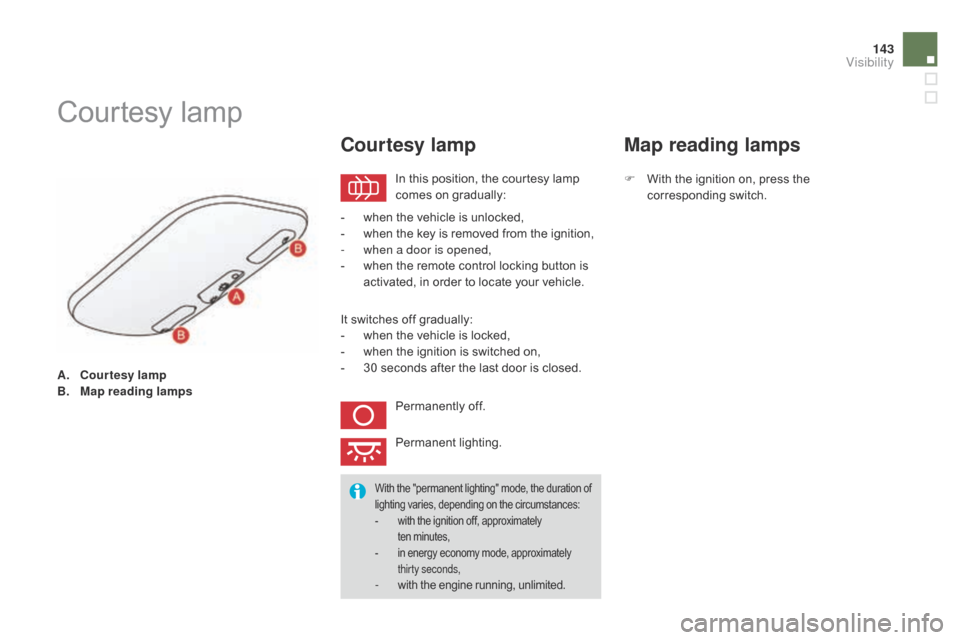
143
DS3_en_Chap07_visibilite_ed01-2014
A. courtesy lamp
B. M
ap reading lamps
Courtesy lam p
In this position, the courtesy lamp c
omes on gradually:
courtesy lamp
- when the vehicle is unlocked,
- w hen the key is removed from the ignition,
-
w
hen a door is opened,
-
w
hen the remote control locking button is
a
ctivated, in order to locate your vehicle.
It
switches off gradually:
-
w
hen the vehicle is locked,
-
w
hen the ignition is switched on,
-
3
0 seconds after the last door is closed.
Permanently
off.
Permanent
l
ighting.
With the "permanent lighting" mode, the duration of lighting varies, depending on the circumstances:
-
w
ith the ignition off, approximately
t
en minutes,
-
i
n energy economy mode, approximately
t
hirty seconds,
- with the engine running, unlimited.
Map reading lamps
F With the ignition on, press the c
orresponding s witch.
Visibility
Page 146 of 376

DS3_en_Chap07_visibilite_ed01-2014
Interior mood lightingThe dimmed passenger compartment lighting improves visibility in the vehicle when the light
i s poor.
Switching on
At night, the illumination of footwells and the central dashboard storage compartment comes
o
n automatically when the sidelamps are
s
witched on.
Switching off
The interior mood lighting switches off automatically when the sidelamps are
switched
off.
It
can be switched off manually using the
i
nstrument panel lighting rheostat button.
F
W
ith the lighting on, press several times on
t
he left hand button of the instrument panel
t
o progressively reduce the dashboard
l
ighting level.
F
P
ress again to reduce the lighting level
t
o the minimum and switch off the interior
m
ood
l
ighting. This
comes on automatically when the boot is o
pened and goes off automatically when the b
oot is closed.
Boot lamp
The lighting time varies according to the circumstances:
- w hen the ignition is off, approximately t
en minutes,
-
i
n energy economy mode, approximately
t
hirty
seconds,
- when the engine is running, no limit.
Page 150 of 376
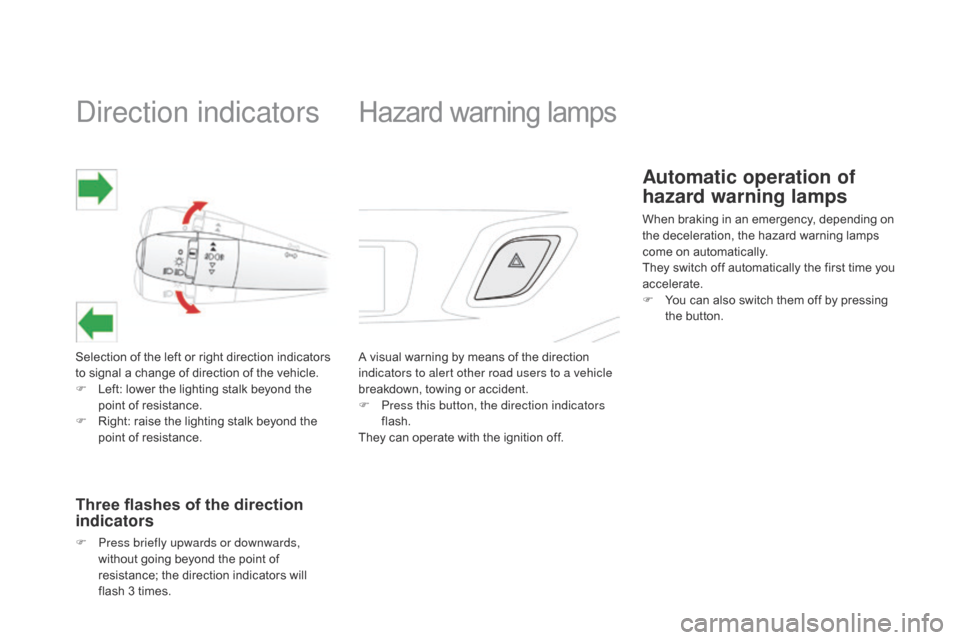
Direction indicators
Selection of the left or right direction indicators to signal a change of direction of the vehicle.
F
L
eft: lower the lighting stalk beyond the
p
oint of resistance.
F
R
ight: raise the lighting stalk beyond the
p
oint of resistance.
Three flashes of the direction
indicators
F Press briefly upwards or downwards, without going beyond the point of
r
esistance; the direction indicators will
f
lash 3 times.
Hazard warning lam ps
A visual warning by means of the direction i
ndicators to alert other road users to a vehicle
breakdown,
towing or accident.
F
P
ress this button, the direction indicators
flash.
They
can operate with the ignition off.
Automatic operation of
hazard warning lamps
When braking in an emergency, depending on the deceleration, the hazard warning lamps
c
ome on automatically.
They
switch off automatically the first time you
a
ccelerate.
F
Y
ou can also switch them off by pressing
t
he button.
Page 156 of 376
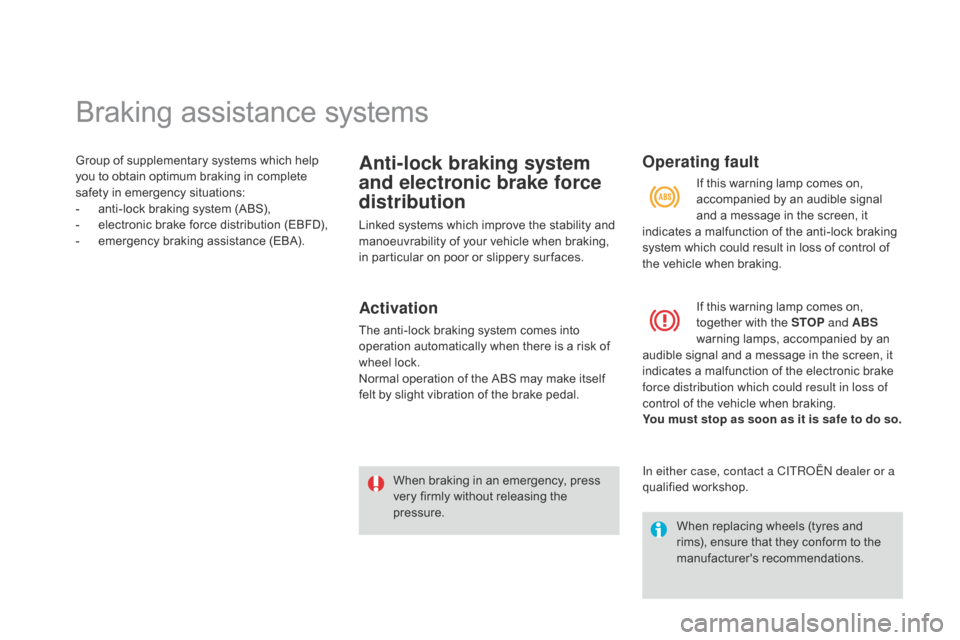
Braking assistance systems
Group of supplementary systems which help you to obtain optimum braking in complete
s
afety in emergency situations:
-
a
nti-lock braking system (ABS),
-
e
lectronic brake force distribution (EBFD),
-
e
mergency braking assistance (EBA).Anti-lock braking system
and electronic brake force
distribution
Linked systems which improve the stability and manoeuvrability of your vehicle when braking,
i
n particular on poor or slippery sur faces.
Activation
The anti-lock braking system comes into operation automatically when there is a risk of
w
heel lock.
Normal
operation of the ABS may make itself
f
elt by slight vibration of the brake pedal.
When
braking in an emergency, press
v
ery firmly without releasing the
p
ressure.
Operating fault
If this warning lamp comes on, together with the STOP and ABS
warning
lamps, accompanied by an
a
udible
signal and a message in the screen, it
i
ndicates
a malfunction of the electronic brake
f
orce distribution which could result in loss of
control
of
the vehicle when braking.
You must stop as soon as it is safe to do so.
When
replacing wheels (tyres and
r
ims), ensure that they conform to the
ma
nufacturer's
r
ecommendations.
If
this warning lamp comes on,
a
ccompanied by an audible signal
a
nd a message in the screen, it
i
ndicates
a malfunction of the anti-lock braking
s
ystem
which could result in loss of control of
t
he
vehicle when braking.
In either case, contact a CITR
oË
N dealer or a
qualified
w
orkshop.
Page 166 of 376
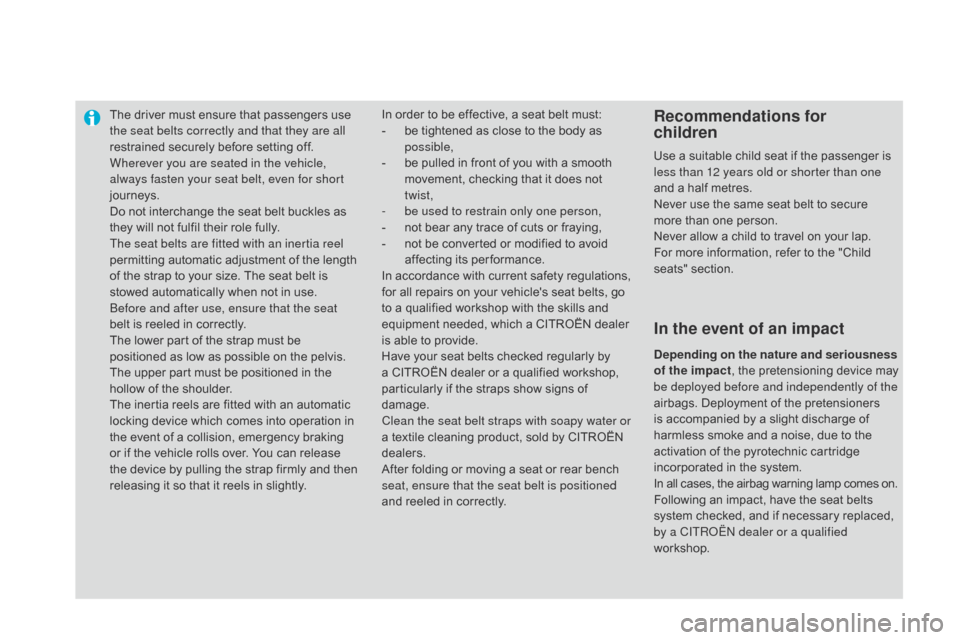
The driver must ensure that passengers use the seat belts correctly and that they are all
restrained
securely before setting off.
Wherever you are seated in the vehicle,
always fasten your seat belt, even for short
journeys.
Do
not interchange the seat belt buckles as
t
hey will not fulfil their role fully.
The seat belts are fitted with an inertia reel
permitting
automatic adjustment of the length
o
f the strap to your size. The seat belt is
s
towed automatically when not in use.
be
fore and after use, ensure that the seat
belt
is reeled in correctly.
The
lower part of the strap must be
p
ositioned as low as possible on the pelvis.
The
upper part must be positioned in the
h
ollow of the shoulder.
The
inertia reels are fitted with an automatic
l
ocking device which comes into operation in
t
he event of a collision, emergency braking
o
r if the vehicle rolls over. You can release
t
he device by pulling the strap firmly and then
r
eleasing it so that it reels in slightly.In
order to be effective, a seat belt must:
- b e tightened as close to the body as
p
ossible,
-
b
e pulled in front of you with a smooth
m
ovement, checking that it does not
t
wist,
-
b
e used to restrain only one person,
-
n
ot bear any trace of cuts or fraying,
-
n
ot be converted or modified to avoid
a
ffecting
it
s
p
erformance.
In
a
ccordance
w
ith
c
urrent
s
afety
r
egulations,
f
or all repairs on your vehicle's seat belts, go
t
o a qualified workshop with the skills and
e
quipment needed, which a CITROËN dealer
i
s able to provide.
Have
your seat belts checked regularly by
a
CITROËN dealer or a qualified workshop,
p
articularly if the straps show signs of
d
amage.
Clean the seat belt straps with soapy water or
a
textile cleaning product, sold by CITROËN
d
ealers.
After
folding or moving a seat or rear bench
s
eat, ensure that the seat belt is positioned
and
reeled in correctly.Recommendations for
children
Use a suitable child seat if the passenger is less than 12 years old or shorter than one
and
a half metres.
Never
use the same seat belt to secure
m
ore than one person.
Never
allow a child to travel on your lap.
For
more information, refer to the "Child
sea
ts"
se
ction.
In the event of an impact
depending on the nature and seriousness
of the impact ,
the pretensioning device may
b
e deployed before and independently of the
airbags.
Deployment of the pretensioners
i
s accompanied by a slight discharge of
h
armless smoke and a noise, due to the
a
ctivation of the pyrotechnic cartridge
i
ncorporated in the system.
In
all cases, the airbag warning lamp comes on.
Following
an impact, have the seat belts
s
ystem checked, and if necessary replaced,
b
y a CITR
oË
N dealer or a qualified
workshop.
Page 167 of 376
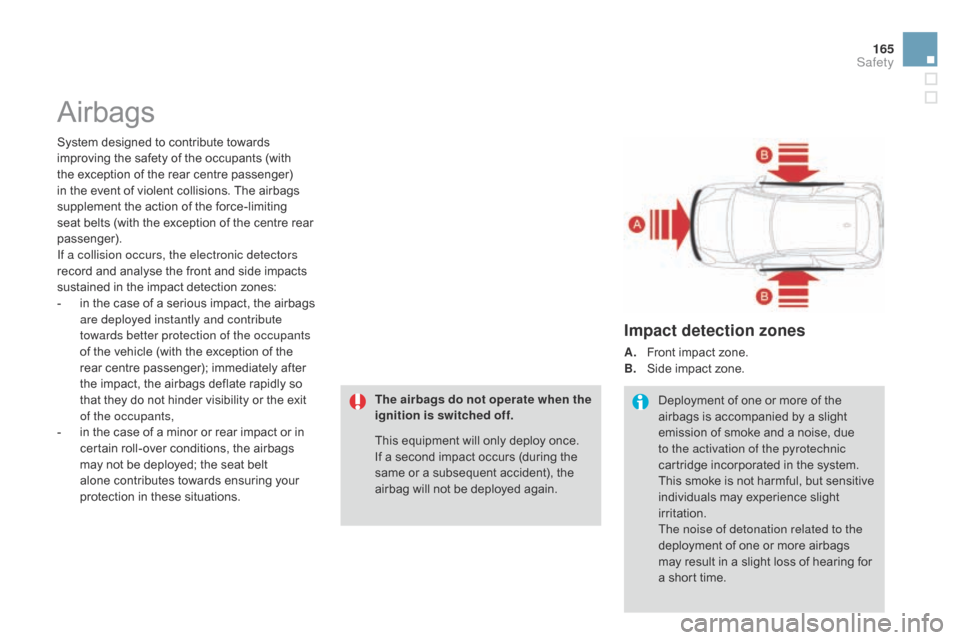
165
DS3_en_Chap08_securite_ed01-2014
Airbags
System designed to contribute towards improving the safety of the occupants (with
t
he exception of the rear centre passenger)
i
n the event of violent collisions. The airbags
s
upplement the action of the force-limiting
s
eat belts (with the exception of the centre rear
p
assenger).
If a collision occurs, the electronic detectors
record
and analyse the front and side impacts
s
ustained in the impact detection zones:
-
i
n the case of a serious impact, the airbags
a
re deployed instantly and contribute
towards better protection of the occupants
of
the vehicle (with the exception of the
r
ear centre passenger); immediately after
t
he impact, the airbags deflate rapidly so
t
hat they do not hinder visibility or the exit
o
f the occupants,
-
i
n the case of a minor or rear impact or in
c
ertain roll-over conditions, the airbags
m
ay not be deployed; the seat belt
a
lone contributes towards ensuring your
p
rotection in these situations. This
equipment will only deploy once.
I
f a second impact occurs (during the
s
ame or a subsequent accident), the
a
irbag will not be deployed again.
Impact detection zones
A. Front impact zone.
B. S ide impact zone.
Deployment
of one or more of the
a
irbags is accompanied by a slight
e
mission of smoke and a noise, due
t
o the activation of the pyrotechnic
cartridge
incorporated in the system.
This
smoke is not harmful, but sensitive
i
ndividuals may experience slight
ir
ritation.
The noise of detonation related to the
deployment
of one or more airbags
m
ay result in a slight loss of hearing for
a
short time.
The airbags do not operate when the
ignition is switched off.
Safety
Page 202 of 376
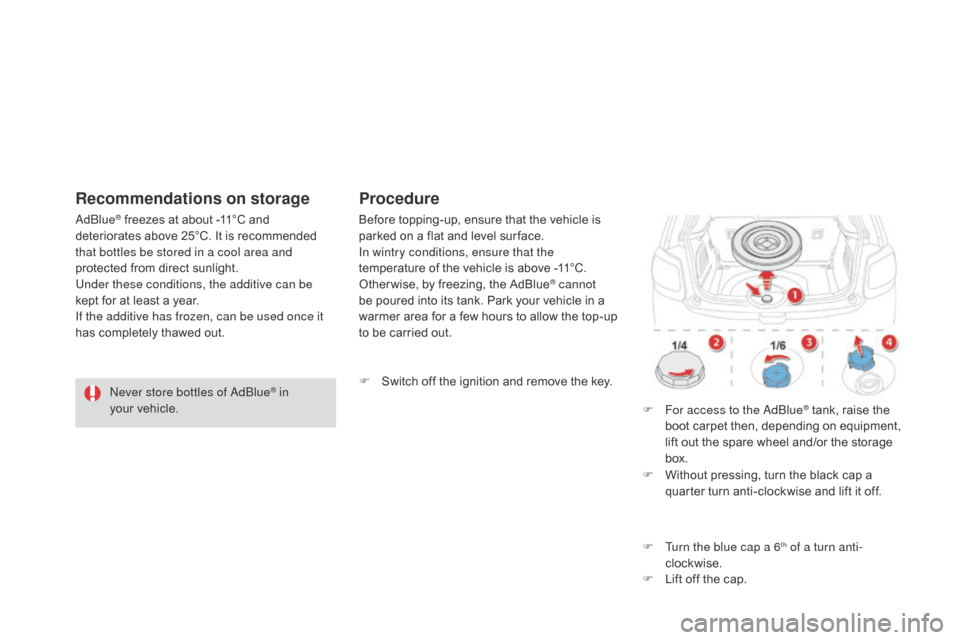
DS3_en_Chap10_info-pratiques_ed01-2014
Never store bottles of adblue® in
your vehicle.
a
d
blu
e
® freezes at about -11°C and d
eteriorates above 25°C. It is recommended
t
hat bottles be stored in a cool area and
protected
from direct sunlight.
Under these conditions, the additive can be
kept
for
at least a year.
If the additive has frozen, can be used once it
has
completely thawed out.
Recommendations on storage
Before topping-up, ensure that the vehicle is parked on a flat and level sur face.
In wintry conditions, ensure that the
temperature
of the vehicle is above -11°C.
O
ther wise, by freezing, the AdBlue
® cannot
be
poured
into
its
tank.
Park
your
vehicle in a
w
armer
area
for
a
few
hours
to
allow the top-up
t
o
be
carried
out.
Procedure
F Switch off the ignition and remove the key.
F
F
or access to the a
dbl
ue
® tank, raise the b
oot
carpet
then,
depending on equipment,
l
ift
out
the
spare
wheel
and/or the storage
b
ox.
F
W
ithout
pressing,
turn
the
black cap a
q
uarter
turn
anti-clockwise and lift it off.
F
T
urn the blue cap a 6
th of a turn anti-
clockwise.
F
L
ift
off
the
cap.
Page 211 of 376
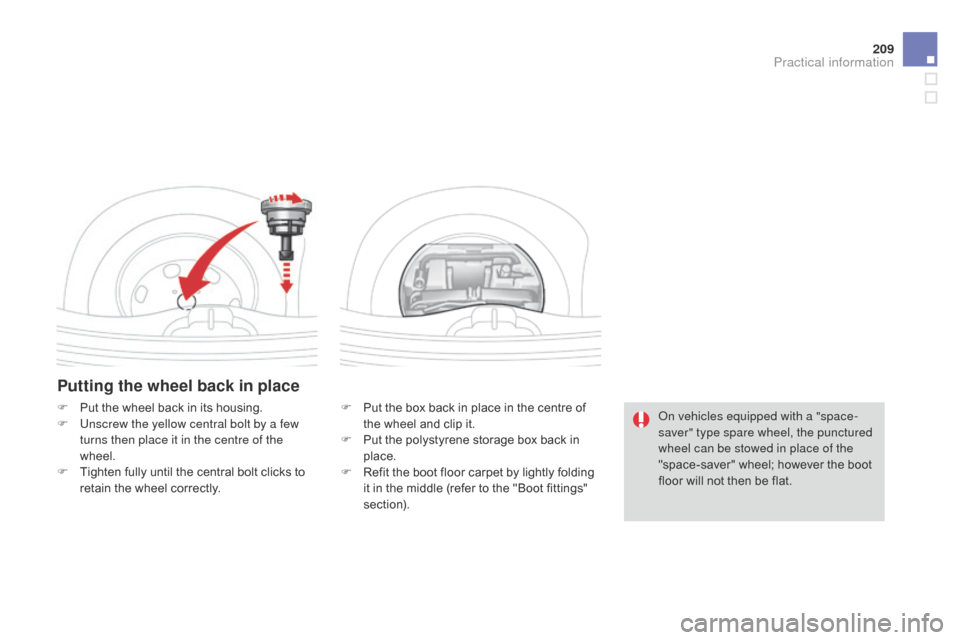
209
DS3_en_Chap10_info-pratiques_ed01-2014
Putting the wheel back in place
F Put the box back in place in the centre of t
he wheel and clip it.
F
P
ut the polystyrene storage box back in
p
lace.
F
R
efit the boot floor carpet by lightly folding
i
t in the middle (refer to the "Boot fittings"
s
ection).
F
P
ut
the
wheel
back
in
its
housing.
F
U
nscrew the yellow central bolt by a few
turns then place it in the centre of the
wheel.
F
T
ighten
fully
until
the
central
bolt
clicks
to
r
etain
the
wheel
correctly.on v ehicles equipped with a "space-
saver" type spare wheel, the punctured
wheel can be stowed in place of the
"space-saver"
wheel; however the boot
f
loor will not then be flat.
Practical information
Page 219 of 376
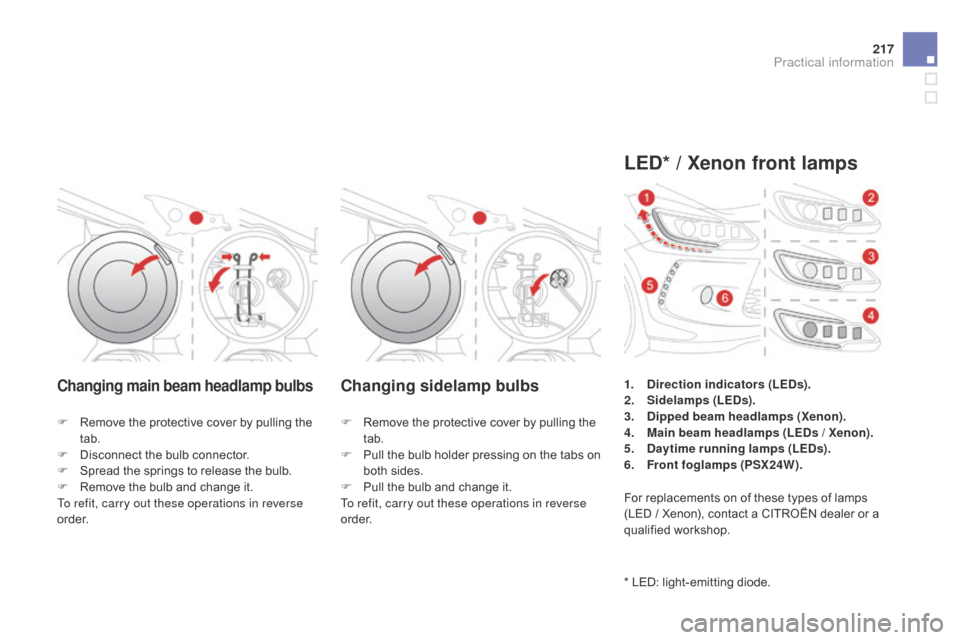
217
DS3_en_Chap10_info-pratiques_ed01-2014
changing main beam headlamp bulbschanging sidelamp bulbs
F Remove the protective cover by pulling the t
ab.
F
D
isconnect the bulb connector.
F
S
pread the springs to release the bulb.
F
R
emove the bulb and change it.
To refit, carry out these operations in reverse
o r d e r. F
R emove the protective cover by pulling the t
ab.
F
P
ull the bulb holder pressing on the tabs on
bo
th
s
ides.
F
P
ull the bulb and change it.
To refit, carry out these operations in reverse
o r d e r.
LEd* / Xenon front lamps
* LED: light-emitting diode.
1.
di
rection indicators (LE
ds
).
2.
S
idelamps (LE d s).
3.
di
pped beam headlamps (Xenon).
4.
M
ain beam headlamps (LE
ds / Xe
non).
5.
da
ytime running lamps (LE d s).
6.
F
ront foglamps (PSX24W).
For replacements on of these types of lamps
(
LED / Xenon), contact a CITROËN dealer or a
q
ualified
w
orkshop.
Practical information
Page 225 of 376
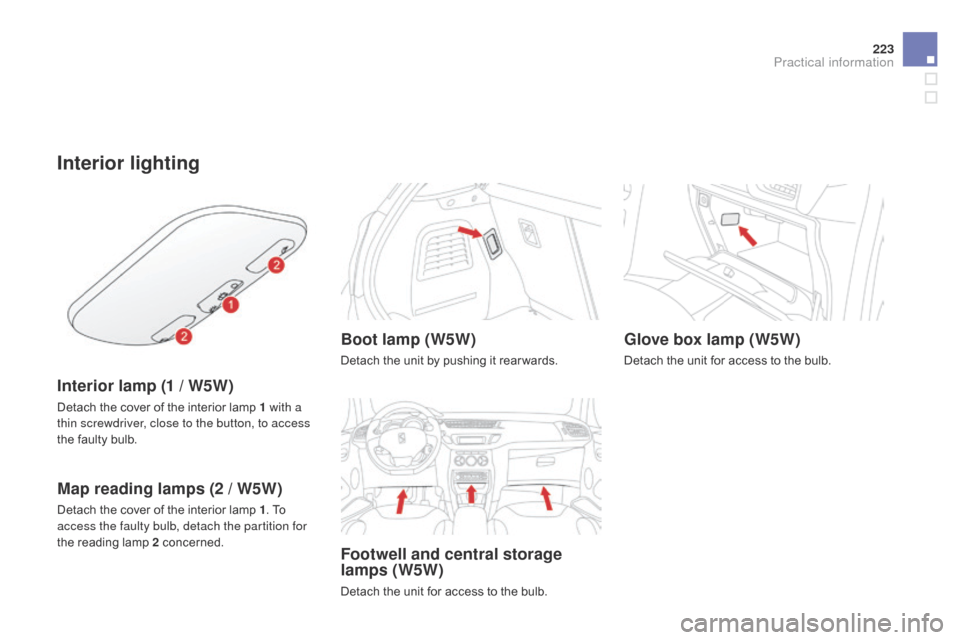
223
DS3_en_Chap10_info-pratiques_ed01-2014
Interior lighting
Interior lamp (1 / W5W)
Detach the cover of the interior lamp 1 with a
t hin screwdriver, close to the button, to access
the
faulty bulb.
Map reading lamps (2 / W5W)
Detach the cover of the interior lamp 1. To a
ccess the faulty bulb, detach the partition for
the
reading lamp 2
c
oncerned.
Boot lamp (W5W)
Detach the unit by pushing it rear wards.
Footwell and central storage
lamps (W5W)
Detach the unit for access to the bulb.
Glove box lamp (W5W)
Detach the unit for access to the bulb.
Practical information